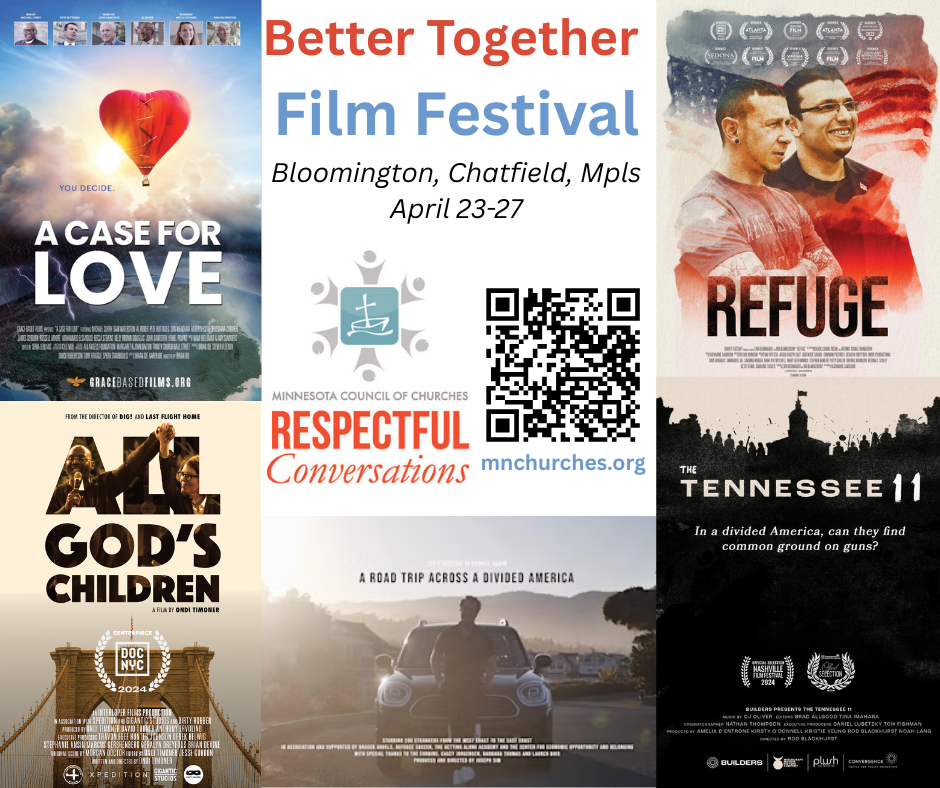Movies won't fix America, but they might help us talk to each other again

Most Americans—87%, in fact—are tired of political division. It’s not just a nuisance; the same number believe polarization threatens the future of our country. We know it’s bad. We feel it every time a family meal turns tense or when neighbors stop talking over yard signs.
But here’s something surprising: 70% of us also say we feel personally responsible for bridging divides. We want to reconnect. We just don’t know how.
During the last week of April – the first week of the Easter season - six churches and community groups across Minnesota are offering one answer: watch a movie together. Not just any movie—films that tell real stories of people bridging hard divides. They’re part of the Better Together Film Festival, a national, week-long event offering one simple, evidence-based intervention to help us reconnect as Americans.
Yes, watching a film can actually make a difference.
When people view stories about others reaching across differences—whether racial, religious, or political—they tend to become more empathetic. A study last year found that empathy towards those with different views increased by around eight percent after watching movies like these. Even more importantly, viewers felt more confident in their own ability to connect with someone on “the other side.” That’s no small shift in an age of cable news echo chambers and social media outrage algorithms.
One film, the award-winning Refuge, follows a Muslim refugee who reaches out to a KKK leader. Another, A Case for Love, features voices like Bishop Michael Curry and Pete Buttigieg reflecting on the power of unselfish love in a divided society. A third, All God’s Children, the centerpiece of the NYC DOC film festival, highlights a Black Church and a Synagogue trying to do life together after racism and anti-Semitic events. These and two others are not escapist fantasies; they’re compelling, real-life stories about what reconciliation actually looks like.
The Better Together Film Festival is coordinated by the ListenFirst Coalition and hosted in Minnesota by six organizations from Chatfield to Minneapolis. Each location picked a film that spoke to their own community’s concerns. The screenings are free and open to all. Afterward, audience members are invited to complete a brief survey to help researchers understand how the experience shaped their attitudes. This is not just feel-good entertainment; it’s a shared national experiment in social healing.
At the Minnesota Council of Churches, we’ve spent over a decade helping people navigate tough conversations through our Respectful Conversations program. Nearly 9,000 people across Minnesota, Wisconsin, and North Dakota have used this approach in faith communities, universities, and through local governments. We’ve found that when people sit down face to face—even across painful disagreements—they can move beyond stereotypes and rediscover each other’s humanity.
We recently collaborated on a national research project that tested ways to reduce affective polarization—the emotional disgust people can feel for others who think differently. What we’re seeing is that storytelling, even in the form of a short video or documentary, can change how we relate to others. And that change is measurable.
The Better Together Film Festival builds on that. It asks a simple question: what happens when people gather, not to debate or convert, but to witness and reflect together? Our hope is that participants won’t leave thinking differently—they’ll leave feeling differently. More curious. More open. More connected. This is an event designed not to change minds, but soften hearts.
In the Christian tradition, we are called to “love our enemies.” That sounds idealistic. Maybe even impossible. But data indicates it’s not just a spiritual directive—it’s something we can actually achieve in practical, measurable ways.
Movies won’t fix America. But they watching them can help us take the first step toward listening again.
So come. Bring a friend—or better yet, someone you disagree with. Join us for a film. Then, let’s talk.
To learn more or find a Better Together Film Festival screening near you, visit www.mnchurches.org.



